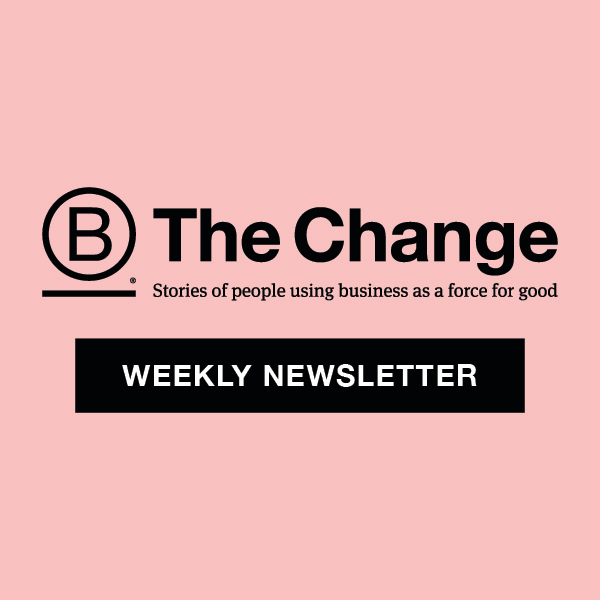Policy Reform: Collective Action to Change the Rules of Business to Benefit Governance Model
November 3, 2021
B Lab U.S. & Canada Policy Update Plus 5 Actions You Can Take to Accelerate the Transition to a Stakeholder Economy
The rules that govern how the majority of corporations operate and make decisions are currently determined by one dominating policy: shareholder primacy. This concept requires corporate leaders and boards of directors to place returns to shareholders — profits — above all else. This theory means that every decision about ingredients for products, benefits for employees, and even locations for production factories must all tie back to either increasing or at least not harming the ability of the corporation to return profits to its shareholders.
If a decision to offer paid parental leave, for example, can be shown to potentially reduce shareholder earnings, shareholders could bring a lawsuit to the company. This action is legally protected and in fact encouraged by shareholder primacy.
The COVID-19 pandemic and the reckoning with racial injustice have further exposed the flaws of shareholder primacy. The time to end this practice is now. Shareholder primacy is at the root of many of the challenges society faces — wealth inequality, systemic racism, gender inequality, and more.
As shareholder primacy is a legal requirement under state law for the vast majority of corporations, it will require policy action to change the rules of the game to focus on stakeholder governance instead. These models have also been called stakeholder capitalism, benefit governance, stakeholder-driven economics, and other related terms. In contrast, a benefit governance model requires a balance between impact on all stakeholders — including the environment, communities, and workers — and impact on the bottom line.
The United States and the business community stand at a crossroads. With a global pandemic and economic crises affecting all communities, business leaders face a choice about how to rebuild. Rather than go back to business as usual, company leaders — across party lines, in both private and public sectors, and from the streets to the boardrooms — must seek a new path. Legislative and regulatory changes can provide for mandatory benefit governance and expand investors’ fiduciary responsibilities to protect the broad interests of beneficiaries. With partners across industry and across the political aisle, business leaders can pursue these ambitious but realistic changes to build a more resilient economy.

Sign up for B The Change Weekly
Learn more about the community of Certified B Corporations using business as a force for good, and sign up to receive the B The Change Weekly newsletter for more stories like this one, delivered straight to your inbox once a week.
This focus has driven the policy work of B Lab U.S. & Canada through this last year. The U.S. policy agenda revolves around three core reforms:
- First, in order to see systems change we need to see benefit governance in both companies and investors. This will prompt alignment across the investing chain so that all actors are managing their impact as well as the system in which they operate.
- Second, that companies and institutional investors be required to adopt benefit governance. While the voluntary adoption of a leading segment of the private sector, i.e. the current wave of Certified B Corporations and benefit corporations, can be influential, it will not be sufficient to enact true and lasting systems change.
- Third, living into these commitments will require transparency and disclosure using credible standards for both investors and companies.
B Lab U.S. & Canada’s 2021-2022 Policy Work to Advance Benefit Governance
Over the past several months, B Lab U.S. & Canada has made significant policy progress toward advancing benefit governance while increasing awareness of the B Corp community, including:
In April 2021, B Lab U.S. & Canada joined 50 impact-oriented organizations to encourage the Biden Administration to form a White House Initiative on Inclusive Economic Growth. The proposed initiative would address three monumental crises: COVID-19 and its economic fallout, a widening racial wealth gap caused by systemic racism, and the increasingly dire effects of climate change.
Since then, key members of Congress have come out in support of the initiative. In August, Reps. David Cicilline (D-RI), Dean Phillips (D-MN), and 16 of their House colleagues sent a letter to President Biden backing the initiative. And in September, Sens. Mark Warner (D-VA), Dianne Feinstein (D-CA), and Chris Van Hollen (D-MD) agreed with B Lab U.S. & Canada’s efforts and issued their own letter to President Biden advocating for a White House Initiative on Inclusive Economic Growth.
B Lab U.S. & Canada engaged with key lawmakers, policymakers, and stakeholders to advance benefit governance. B Lab U.S. & Canada discussed the role of the B Corp community and the reforms needed to begin a shift from shareholder primacy to stakeholder capitalism with members of relevant committees including the House Small Business Committee, the House Committee on Financial Services, the Senate Small Business Committee, and the Senate Committee on Banking, Housing, and Urban Affairs.
Most recently, B Lab U.S. & Canada hosted congressional staff and media for a virtual briefing on the role of B Corps with Patagonia, Danone North America, Revolution Foods, and Southern Bancorp. B Lab U.S. & Canada Board Member and former Governor of Massachusetts Deval Patrick participated in the event geared toward informing Capitol Hill on the path forward for capitalism.

The Systemic Change Our Economy Needs
A new impact economy is being built, one where businesses prioritize and consider their impact on all the stakeholders they impact — including communities, workers, customers, and the environment. This free report outlines how the stakeholder model as practiced by B Corps is gaining global traction and validation.
B Lab U.S. & Canada positioned itself as a resource for the Administration. B Lab U.S. & Canada, alongside B Corps Patagonia, Danone North America, and City First, joined a Community Engagement Insight Series with 18 staffers from the U.S. Treasury Department in early October 2021. The series brought together thought leaders to discuss policy ideas and research. Conversation focused on the mission of B Lab U.S. & Canada and B Corps, the intersection of that mission with climate- and equity-related matters, and changes needed on the federal level.
B Lab U.S. & Canada also joined a meeting with Vice President Kamala Harris’s staff and shared thoughts on the policy changes needed to reshape capitalism by taking into account the interests of stakeholders. B Lab U.S. & Canada has since then established a relationship with senior staff in the Office of the Vice President to continue the dialogue.
Looking ahead, B Lab U.S. & Canada will continue to work on advancing policy priorities through meetings with key members of Congress and other interested parties to discuss draft legislation, regulations, and the best path forward on creating an economy that works for all. The top priorities for 2022 at this time include:
- Engaging and mobilizing the B Corp community as policy advocates (see action items for B Corps and other businesses below);
- Developing trainings, coordination calls, and leadership groups to support B Corp advocacy;
- Working with the White House and the Senate to hopefully introduce a bill in 2022.
Engaging the B Corp Community: Opportunities for Businesses to Take Policy Action to Advance Benefit Governance Initiatives
The U.S. & Canada B Corp community has been engaging in policy advocacy on many topics. Here are a few opportunities to take collective action. (If you’re a B Corp, please share additional opportunities on the B Hive):
- Share Information About B Corps and Benefit Corps with Your Congressional Contacts: On October 13, B Lab held a congressional briefing on B Corps, benefit corporations and why it is important for Congress to encourage business to have a purpose beyond profit. The briefing was recorded and featured B Corps including Patagonia, Revolution Foods, Danone North America, and Southern Bancorp as well as B Lab U.S. & Canada’s new CEO Jorge Fontanez, B Lab Global CEO Andrew Kassoy and Former Governor Deval Patrick. Please share the recording of the briefing with your Congressional leaders to educate them on this important topic. Use this email template to get started!
- Continue Pushing Calls to Congress via #Call4ClimateNOW: Businesses from across the U.S. are joining the #Call4ClimateNOW campaign to encourage the American public to call on lawmakers and urge them to address the threat of climate change. Over 150 businesses, including more than 60 B Corps, are participating in this campaign spearheaded by the Climate Collaborative. Find more information and sign up to get access to the main campaign toolkit. Or use this B Corp-specific mini toolkit. B Corps that have signed up and been sharing with employees and followers should continue these efforts! Check out these sample posts for the next big push, and find inspiration here from participating companies.
- Sign the Business Advocacy Letter From Ceres: B Lab U.S. & Canada’s partners at Ceres have organized a business sign-on letter to Congress to express strong support for the enactment of climate and clean energy investments in the bipartisan infrastructure and Build Back Better budget reconciliation packages. Businesses can sign and show their support for the critical climate-smart components, including the Clean Electricity Performance Program (CEPP), expanded clean energy and transportation tax incentives, and a price on carbon or corporate polluter fee. Sign the letter now! (Note: This opportunity closes Nov. 8, 2021.)
- Email or Call Your Congressional Lawmakers: U.S.-based businesses are encouraged to email or call Senate and House lawmakers and ask them to support the key climate provisions. This is particularly important in these states: Arizona, California, Florida, Georgia, Illinois, Maine, Michigan, Minnesota, New Jersey, Nevada, Pennsylvania, Texas, Virginia, and West Virginia. Businesses located in or with operations in these states can check this list of key representatives and contact information for staff. Find a sample email template here.
- Join the U.S. & Canada B Corp Climate Collective’s Legislative Advocacy Group and Our Partner Ceres for an Interactive Briefing: This free online briefing will provide highlights on the 2021 policy wins as well as a preview for what lies ahead in 2022. The event will also feature B Corp speakers who can share their hard-won advocacy best practices. Register for the event here.
Sign Up for our B The Change Newsletter
Read stories on the B Corp Movement and people using business as a force for good. The B The Change Newsletter is sent weekly.